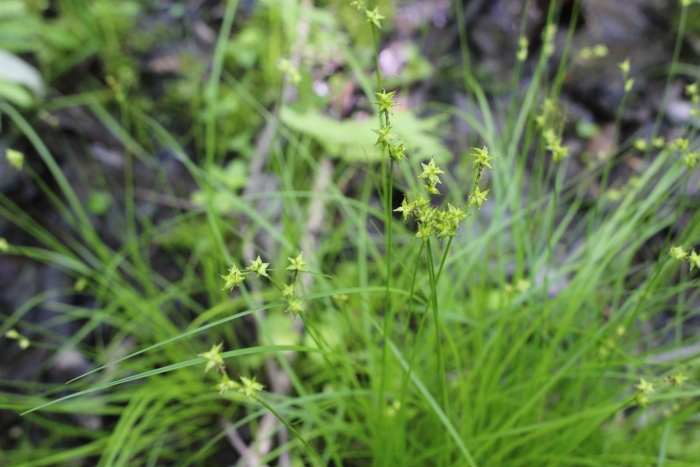Inland Sedge
(Carex interior)
Inland Sedge (Carex interior)
/
/

Quinten Wiegersma
CC BY 4.0
Image By:
Quinten Wiegersma
Recorded By:
Copyright:
CC BY 4.0
Copyright Notice:
Photo by: Quinten Wiegersma | License Type: CC BY 4.0 | License URL: http://creativecommons.org/licenses/by/4.0/ | Rights Holder: Quinten Wiegersma | Publisher: iNaturalist | Date Created: 2021-05-29T14:16:48-07:00 |

























Estimated Native Range
Summary
Carex interior, commonly known as Inland Sedge, is a perennial herb native to a variety of wetland habitats across North America, including Alaska, northern Mexico, and the mid-Atlantic United States. It is particularly adapted to calcareous wetlands, such as fens, sedge meadows, and marsh edges, where it forms dense tussocks. Inland Sedge typically grows to about 1 meter in height and features narrow, grass-like leaves. The plant produces inconspicuous, star-shaped flower spikes during late spring to early summer, followed by distinctive fruits encapsulated in a toothed, red-tipped perigynium, which are of interest to wetland ecologists but are not particularly ornamental.
In cultivation, Carex interior is valued for its ability to thrive in wet conditions and is often used in rain gardens, wetland restoration projects, and as a component of wildlife-friendly landscaping. It prefers full sun to part shade and requires consistently moist to wet soils with a high pH (calcareous). While not commonly used in traditional garden settings, it can be an excellent choice for naturalistic plantings and erosion control in suitable wet environments. Inland Sedge is low maintenance, but gardeners should be aware that it can spread via rhizomes and may require management to keep it within bounds. It is not known for serious pest or disease issues.CC BY-SA 4.0
In cultivation, Carex interior is valued for its ability to thrive in wet conditions and is often used in rain gardens, wetland restoration projects, and as a component of wildlife-friendly landscaping. It prefers full sun to part shade and requires consistently moist to wet soils with a high pH (calcareous). While not commonly used in traditional garden settings, it can be an excellent choice for naturalistic plantings and erosion control in suitable wet environments. Inland Sedge is low maintenance, but gardeners should be aware that it can spread via rhizomes and may require management to keep it within bounds. It is not known for serious pest or disease issues.CC BY-SA 4.0
Plant Description
- Plant Type: Grass
- Height: 1.5-2.5 feet
- Width: 1-2 feet
- Growth Rate: Slow
- Flower Color: N/A
- Flowering Season: Spring, Summer
- Leaf Retention: Deciduous
Growth Requirements
- Sun: Full Sun, Part Shade
- Water: High
- Drainage: Medium, Slow
Common Uses
Bank Stabilization, Bird Garden, Erosion Control, Low Maintenance, Water Garden
Natural Habitat
Calcareous wetlands, such as fens, sedge meadows, and marsh edges
Other Names
Common Names: Inland Star Sedge, Prairie Star Sedge
Scientific Names: , Carex interior, Carex interior f. interior, Carex interior f. keweenawensis, Carex interior subsp. charlestonensis, Carex interior var. keweenawensis, Carex scirpoides, Carex stellulata var. scirpoides, Carex stellulata var. scirpoides, Vignea scirpoides,
GBIF Accepted Name: